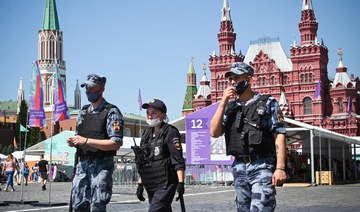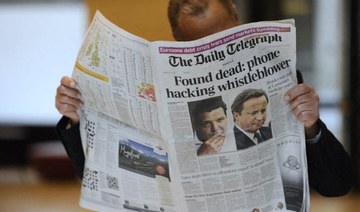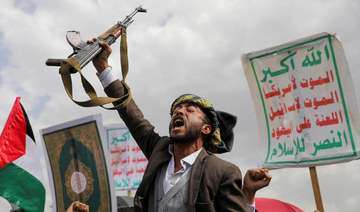MOSCOW: Police in Russia raided the home of the chief editor of an investigative media outlet that was recently designated as a “foreign agent,” the latest move by authorities to raise pressure on independent media before the country’s September parliamentary election.
The Insider news site chief editor Roman Dobrokhotov tweeted Wednesday morning that “police are knocking” on the door of his apartment, and his wife reported the raid to the OVD-Info legal aid group before her phone became unavailable.
A lawyer from another legal aid group, Pravozashchita Otkrytki, headed to Dobrokhotov’s apartment. The group said police seized cellphones, laptops and tablets during the raid, as well as Dobrokhotov’s international passport. Sergei Yezhov, a journalist with The Insider, said that Dobrokhotov was supposed to leave Russia on Wednesday.
Police also raided the home of Dobrokhotov’s parents, The Insider said.
Russian opposition supporters, independent journalists and human rights activists have faced increased government pressure ahead of September’s voting, which is widely seen as an important part of President Vladimir Putin’s efforts to cement his rule before a 2024 presidential election.
The 68-year-old Russian leader, who has been in power for more than two decades, pushed through constitutional changes last year that would potentially allow him to hold onto power until 2036.
In recent months, the government has designated several independent media outlets and journalists as “foreign agents” — a label that implies additional government scrutiny and carries strong pejorative connotations that could discredit the recipients.
The targeted outlets include VTimes and Meduza. VTimes subsequently shut down, citing the loss of advertisers, and Meduza launched a crowd-funding campaign after encountering the same problem.
The Insider was the latest addition to the list. The news outlet, which is registered in Latvia, has worked with the investigative group Bellingcat to investigate high-profile cases, such as the nerve agent poisonings of former Russian spy Sergei Sripal and Russian opposition leader Alexei Navalny,
The Russian Justice Ministry acted under a law that is used to designate as foreign agents non-governmental organizations, media outlets and individuals who receive foreign funding and engage in activities loosely described as political.
In comments to the media, Dobrokhotov has said The Insider would continue to operate as usual, in accordance with Latvian laws, and would not comply with the requirements of the foreign agents law.
Russia used the law to levy heavy fines on US-funded broadcaster Radio Free Europe/Radio Liberty for failing to identify its material as produced by foreign agents. The broadcaster has asked the European Court of Human Rights to intervene.
According to The Insider, the searches targeting Dobrokhotov may be related to a slander case launched in April following a complaint by a Dutch blogger.
The Insider accused Max van der Werff of working with Russian intelligence and military services to spread false information challenging the findings of the official investigation of the downing of the Malaysia Airlines Flight 17 over eastern Ukraine.
Pravozashchita Otkrytki said Dobrokhotov was a witness in a criminal case against “unidentified persons” on the charges of slander, launched over a tweet in Dobrokhotov’s account that contains “disinformation about the downed Boeing MH17.”
Earlier this week Russian authorities blocked about 50 websites linked to the imprisoned opposition leader Navalny. The move comes just a month after a court in Moscow outlawed Navalny’s political infrastructure — his Foundation for Fighting Corruption and a network of regional offices — as extremist in a ruling that prevents people associated with the organizations from seeking public office and exposes them to lengthy prison terms.
Navalny, Putin’s fiercest political foe, was arrested in January upon returning from Germany, where he spent five months recovering from a nerve agent poisoning that he blames on the Kremlin — an accusation rejected by Russian officials.
In February, the politician was ordered to serve 2½ years in prison for violating the terms of a suspended sentence from a 2014 embezzlement conviction that he dismissed as politically motivated.
His arrest and jailing sparked a wave of mass protests across Russia’s 11 time zones, in what appeared to be a major challenge to the Kremlin. The authorities responded with mass arrests of demonstrators and criminal probes against Navalny’s closest associates.
On Wednesday, Lyubov Sobol, a top ally of Navalny and one of the few in his team who hasn’t left Russia despite being prosecuted on a number of charges, said that Russia’s state communications watchdog Roskomnadzor demanded Twitter to take down her account.
Sobol tweeted screenshots of a letter she received from Twitter, notifying her of the authorities’ request to block her account as containing “propaganda of activities” of Navalny’s organizations that have been declared extremist.
“What is it, if not the Kremlin’s hysteria ahead of the election?” Sobol wrote. It wasn’t immediately clear whether the platform would comply with the request.
Home of another investigative journalist in Russia raided
https://arab.news/yfwrb
Home of another investigative journalist in Russia raided

- Russian police raids the home of the chief editor of an investigative media outlet which was designated as a foreign agent.
- The media outlet has investigated high-profile cases, such as the nerve agent poisonings of former Russian spy Sergei Sripal and Russian opposition leader Alexei Navalny
US presses TikTok, Meta and X to crack down on antisemitic posts

- Bloomberg News reports that US special envoy requested big tech to designate a policy team member to address the issue, publicly report trends
- Deborah Lipstadt also asked to differentiate between criticism of the Israeli government and hatred directed at Jews
LONDON: The Biden administration is urging big technology companies to ramp up efforts to curb antisemitic content on their platforms, Bloomberg News reported on Tuesday.
Representatives from companies including Alphabet, Meta, Microsoft, TikTok and X met on Thursday with US special envoy Deborah Lipstadt to monitor and combat antisemitism.
Lipstadt requested that each company designate a policy team member to address the issue and conduct training for key personal to identify antisemitism and publicly report trends in anti-Jewish content.
“We welcomed this convening and were pleased to come together to share facts about the ongoing steps TikTok takes on this important issue and to continue to learn from experts in the room,” a TikTok spokesperson said.
Alphabet, Microsoft, Meta and X did not immediately respond to Reuters’ requests for comment.
Countries around the world have seen a rise in antisemitism following the Oct. 7 attack by Hamas on southern Israel and subsequent bombardment of the Gaza Strip by the Israeli military.
The companies have not yet agreed to voluntary moves, but the administration is hopeful they will act soon, Lipstadt told Bloomberg News.
The administration is also requesting staff training in order to help identify more implicit antisemitic messages on online platforms and to differentiate between criticism of the Israeli government and hatred directed at Jews, Lipstadt added.
Nigel Farage grilled on UK TV following comments denounced as Islamophobic

- Good Morning Britain presenter Richard Madeley challenges former leader of right-wing parties UKIP and Reform UK over controversial comments about Muslims
- Farage said on Sunday that the growing number of Muslims in Britain do not subscribe to country’s traditional values
LONDON: Good Morning Britain presenter Richard Madeley clashed with Nigel Farage during a live TV interview with the former politician about comments he made on Sunday that prompted allegations of Islamophobia.
The former leader of the right-wing UK Independence Party (UKIP) and Reform UK, and honorary president of the latter, sparked controversy when he said there is a “growing number of young people in this country who do not subscribe to British values” and “loathe much of what we stand for.” He specifically referenced the Muslim community.
Madeley challenged Farage by citing a 2018 survey conducted by IPSOS Mori and said: “They found, absolutely conclusively, that Muslims in the UK attach more importance on being British than the general population.
“Eighty-five percent feel they truly belong to Britain, 55 percent feel that their national identity as British is very important to them, and that compares to 44 percent of the general population. So I’m bound to ask, what on earth were you talking about there?”
Farage responded by citing another survey, and argued that his comments on Sunday, during an interview with Sky News, were taken out of context. He claimed 23 percent of 18-to-24-year-old Muslims in Britain believe jihad is a good thing.
“Now that of course is not a British value in any way at all and it’s a very disturbing trend that’s particularly prevalent among the young,” he said, adding that it was “undoubtedly true” that there is an increasing number of young people in Britain who “not only don’t subscribe to our values, they openly support Hamas.”
Madeley and co-presenter Charlotte Hawkins pointed out that the poll Farage referenced was heavily criticized because of its methodology.
“You also said in the interview that you could take someone to a particular street in Oldham and there would be nobody there who speaks English,” Madeley said.
“Well again, that’s just not true; the Office of National Statistics say that only 0.7 percent of people in Oldham don’t speak English. That’s less than one in a hundred.”
Several MPs have condemned Farage’s comments. The minister of state for Northern Ireland, Steve Baker, described the remarks as “ignorant and offensive.”
Meanwhile, BBC News presenter Geeta Guru-Murthy issued an on-air apology on Tuesday after saying earlier in the day that Farage was using his “customary inflammatory language.”
Guru-Murthy, who was speaking after the broadcast of a clip of Farage speaking at a Reform UK event in Dover, said she acknowledged that her comment “didn’t meet the BBC’s editorial standards on impartiality.”
RedBird boss describes failed Telegraph takeover as ‘a shame’ in first comments since deal collapsed
RedBird boss describes failed Telegraph takeover as ‘a shame’ in first comments since deal collapsed

- Rani Raad says failure of bid, blocked by UK legislation banning foreign governments from owning national newspapers, would weaken the publication’s brand
- His Abu-Dhabi-backed investment group is now focusing on selling the titles at a premium and looking at other opportunities
DUBAI: Rani Raad, the CEO of RedBird International Media Investments, described the collapse of the Abu Dhabi-backed company’s takeover bid for British newspaper The Telegraph as “a shame” and said it will ultimately weaken the publication’s brand.
In first public remarks since the deal floundered in April, he told Al Arabiya’s Hadley Gamble, during a conversation at the Arab Media Forum in Dubai on Tuesday, that RedBird had effectively taken charge of The Daily Telegraph, the Sunday Telegraph and The Spectator magazine in December after repaying a $753 million debt owed by owners the Barclay family to Lloyds Bank.
However, finalization of the deal collapsed as a result of UK legislation prohibiting foreign governments from owning British national newspapers.
“In an ideal world I would be sitting in front of you all saying, ‘We own The Telegraph,’” Raad said. “Not only would that be good for us and our portfolio but also good for the people working in paper.
“My fear is what happened in The Telegraph ultimately is something that would cost the paper and its employees more, and the UK government more, than any of us over here.”
Abu Dhabi-backed RedBird International Media Investments (IMI) CEO Rani Raad tells Al Arabiya English’s @_HadleyGamble that The Telegraph will be a “weaker brand” after the company’s planned acquisition of the newspaper collapsed.
— Al Arabiya English (@AlArabiya_Eng) May 28, 2024
Read more: https://t.co/KYDatKWEUb pic.twitter.com/RJDf3wVmBm
Raad said that while it was not his place to comment on UK politics, policymakers had changed the rules when the deal was almost complete, with negative effects on the promotion of inward investments.
“Last year alone, the UK lost 1,200 journalists,” Raad said. “For whatever reason, whether xenophobia or party politics, it was a shame the way it played out.”
He added that the group is now focusing on the sale of The Telegraph and The Spectator for a premium, and he remains optimistic about a successful outcome.
“We will make our money back, and then some, and move on to other markets and focus on other opportunities,” Raad said. “Our only regret, in hindsight, is the timing could have been better crafted.”
He also shared his views on the decline of CNN, and the wider American network television industry, which recently hit a 30-year low in primetime ratings. He spent 25 years at CNN International Commercial, including serving as its president, and believes the news brand should not be counted out just yet.
“RedBird IMI was established in partnership with former CNN CEO Jeff Zucker, alongside partners in Abu Dhabi and Gerry Cardinale in New York. We wanted to focus on news and a new transition,” Raad said.
“What they (CNN) are dealing with is just a situation whereby the sector is going through drastic transformation. They are learning how to serve a new audience and demographic. There is potential for reinvention and growth.
“CNN is a very, very powerful news brand globally. Ultimately, if they find a way to make that transition, to talk to a broader demographic, it’ll be here for a long, long time.”
‘Path to peace is clear but accord is still distant, media must fix its narrative,’ Yemeni PM tells Arab Media Forum

- Ahmad Awad bin Mubarak says that years of war have had catastrophic effect on ordinary citizens
- Media should spread awareness and start dialogue about Yemen’s situation, PM urges
DUBAI: Yemeni Prime Minister Ahmad Awad bin Mubarak has said that while the peace process with the Houthis is “clear,” a formal accord remains out of reach, as he emphasized the crucial role the media must play in shaping the narrative.
Speaking on the sidelines of the three-day Arab Media Forum in Dubai, the prime minister addressed the ongoing challenges faced by his country and the importance of accurate media representation about unfolding events.
In an interview with Syrian news anchor Zeina Yazigi, Mubarak highlighted the daily hardships faced by both himself and ordinary Yemeni citizens due to the ongoing conflict.
“What we are going through is the accumulation of the years of war Yemen has gone through,” Mubarak said.
“We continue to face a dire humanitarian disaster brought upon by the lack of security, by natural disasters, and by the tense situation in the Red Sea. The standard of living remains lacking. If we build a school today, a rocket might destroy it the following morning.”
The prime minister said the main priority for the country was to find a lasting solution and to provide essential services to uplift citizens’ standard of living.
He said: “Our oil refineries stopped operating in October 2022 and that has stripped the government of over 70 percent of its resources. You therefore have a hard time to even provide electricity to citizens.
“The road map to peace is clear. Many negotiations and initiatives have been brought forth by our brothers in Saudi Arabia and Oman. Long negotiations have also taken place in Stockholm and Kuwait but in order for a full ceasefire to happen, you need two willing partners and the Houthis are not yet willing.”
Yemen has been engaged in a bloody civil war between the internationally recognized government and the Iran-backed Houthi group since 2014.
Mubarak, who was kidnapped by the Houthis in 2015 and has publicly shared his experience of fearing for his life, described the war as “ideological,” but expressed hope for peace and stability.
He said: “Yemen is at an important strategic geographical location, with 34 million citizens and very rich natural resources.
“To neglect it is to neglect (a good chunk) of the world’s resources. We are at war, an ideological battle with the Houthis. What morals does a party have when it bombs schoolchildren? When it strips its country of its resources?”
Mubarak stressed the media’s vital role in remedying false narratives.
He added: “The Houthis’ actions in the Red Sea predate the events of Oct. 7. The two are not directly related and it is important that the media is able to distinguish this fact, to spread awareness and start a dialogue.
“It was also previously thought that the Houthis had nothing to do with Iran, and that was simply untrue, proven in time by correct media coverage and analysis. Having the full picture is important.”
In a meeting with Sheikh Ahmed bin Mohammed bin Rashid Al-Maktoum, second deputy ruler of Dubai and chairman of the Dubai Media Council, Mubarak discussed the need for a “unified Arab voice.”
Both sides stressed the important and influential role of the media in supporting stability and enhancing opportunities for peace, promising to work together to develop a framework for preparing a new generation of media professionals.
Mubarak said: “I am proud of my country; it is the cradle of civilization. Despite the hardships, it deserves our sacrifices for a better future.
“We have a strong backbone behind us, the Emiratis, the Saudis and the rest of our brothers. We have a just cause and are keen to maintain our Arab identity and hope for a better future.”
‘Do not expect change in US foreign policy even with new administration,’ experts tell Arab Media Forum

- American regional policy was discussed along with Gaza conflict
DUBAI: American foreign policy remains consistent regardless of the sitting president, and no major strategic shifts should be expected with a new administration, political experts told attendees at the Arab Media Forum in Dubai on Tuesday.
While American elections every four years bring new faces to the forefront, this cycle features familiar candidates, with current Democratic President Joe Biden running for re-election against former Republican President Donald J. Trump.
Dr. Mohammed Al-Rumaihi, a political science professor at Kuwait University, emphasized that America’s actions are driven by its own interests, regardless of the president’s party affiliation.
“We are talking about America, a dominant power with a system that has not changed much throughout its history. We can disagree with it, but we should not make enemies out of it,” Al-Rumaihi said.
“We foster great economic relations with China and Russia, but our weaponry and defense in the region are American-made.”
Al-Rumaihi echoed Saudi diplomat Prince Bandar bin Sultan’s sentiment that “America’s enemies must fear America, but America’s friends must fear it more,” highlighting the Arab world’s political animosity toward US foreign policy due to perceived double standards.
Dr. Raghida Dergham, columnist and executive chairperson of the Beirut Institute, suggested that Biden’s handling of the Gaza situation could have electoral repercussions.
“Biden’s approach on Gaza will no doubt affect his votes. His double standards are glaring. Both running presidents are aware of this as we see them trying to rally the state of Michigan, which has a large Arab base that can affect the votes. And while Washington has a massive impact on the region, we are now seeing (its) different approach as to how the Gulf reacts to it,” she said.
Dergham underscored Saudi Arabia’s firm stance on Gaza and the future creation of a Palestinian state.
She urged other Gulf countries to follow Crown Prince Mohammed bin Salman’s “bold and brave attitude” to pressure US and Israeli diplomatic and security strategies.
“I believe (the) relationship between America and the Gulf will remain stable, however we wish for a president that doesn’t view Arabs solely through the Iranian and Israeli prism.”
Dergham, citing Egyptian journalist Abdel Latif El Menawy, attributed the region’s current tensions to American policies since former President Barack Obama, which left a power vacuum.
“I would still like to say we are not the enemies of the American people; we are in disagreement of their foreign policy however,” she continued.
“We have been brought up with the notion that America’s stance remains unwavering, but that changed when Trump came into power with his character and policies. With what is currently taking place in Gaza, I don’t think Washington can continue to depend on the states it did before.”
The war in Gaza is a major focus of the three-day event in Dubai.
On Tuesday, a panel titled “Palestine through the lens of Arab media” explored the role of media in covering the Palestinian cause amid the ongoing conflict in Gaza.
The humanitarian situation in Gaza is also expected to be a central topic in other sessions, including those featuring Ahmed Awad bin Mubarak, prime minister of Yemen; Jasem Albudaiwi, secretary-general of the Gulf Cooperation Council; and Egyptian comedian and media personality Bassem Youssef, who has been a vocal critic on the international stage since conflict broke out Oct. 7.





















